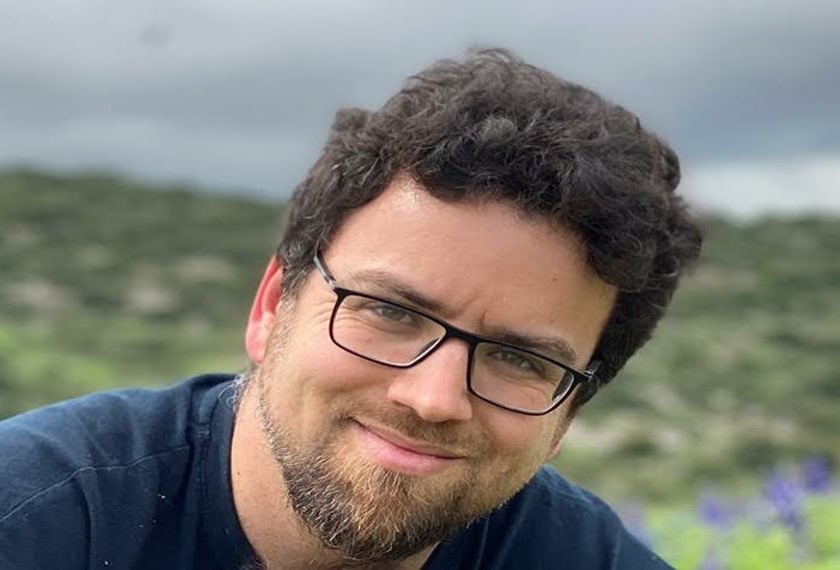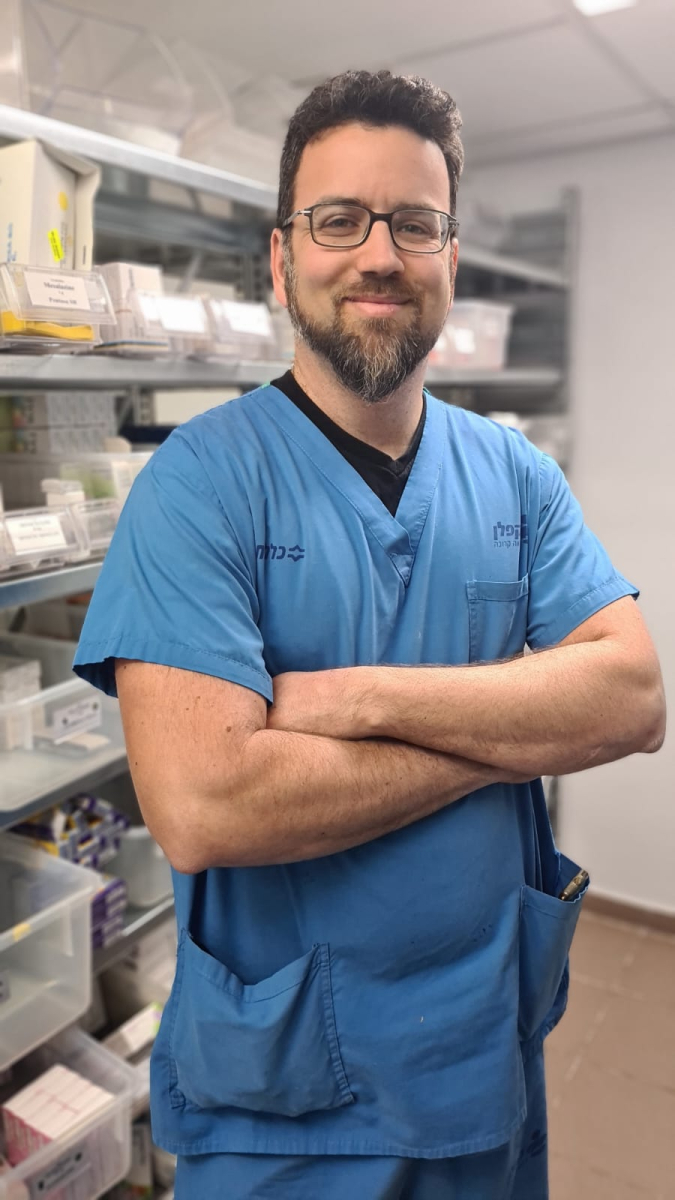הכירו את דותן שניו, בוגר תואר שני בקבוצתו של בריאן ברקוביץ
Date: July 16, 2023
דותן שניו הינו בוגר תואר שני בקבוצתו של בריאן ברקוביץ במחלקה למדעי כדה"א וכוכבי לכת. הוא הגיע למכון מתחום הרוקחות, מתוך רצון ללמוד לעומק מנגנונים מולקולריים של חומרים תרופתיים והצטרף לקבוצתו של בריאן. כיום הוא רוקח במרכז הרפואי קפלן ברחובות, ואחראי על סיוע וייעוץ רוקחי ותרופתי בחטיבת הילדים.
Dotan Shaniv is a master's degree graduate in Brian Berkowitz's group at the EPS Department. He came to the institute from the pharmacy field and joined Brian's group to deepen his understanding of medicinal substances' molecular mechanisms. Today, he is a pharmacist at the Kaplan Medical Center in Rehovot and is responsible for medicinal and pharmaceutical consultancy in the children's ward at the hospital.

דותן הגיע למכון ויצמן מתחום הרוקחות, מתוך רצון ללמוד לעומק מנגנונים מולקולריים של חומרים תרופתיים. במסגרת הרוטציות שמתקיימות במהלך השנה הראשונה של התואר השני, דותן בילה מספר חודשים במעבדה של פרופ' ברקוביץ במחלקה למדעי כדוה"א וכוכבי הלכת, הכיר כמה מחברי הקבוצה ואת הפרוייקטים שלהם, ונחשף לשיטות עבודה מקובלות במעבדה. לאחר שהשלים שלוש רוטציות כנדרש, דותן עדיין לא היה בטוח היכן ירצה להמשיך את עבודת המאסטר. בריאן זיהה את חוסר הוודאות של דותן. "בריאן אדם נהדר עם אישיות מיוחדת", מספר דותן. "הוא הבהיר לי שאני מוזמן להצטרף לקבוצה שלו גם אם אני לא בטוח מה בדיוק ארצה לחקור ונמצא יחד פרויקט שנוכל לעבוד עליו. הגישה הידידותית שלו ותחושת האכפתיות האמיתית שלו השרו עליי רוגע וביטחון".
לבסוף, דותן אכן בחר לעשות את עבודת המחקר לתואר שני אצל בריאן. בניסיון לחבר בין התחום שממנו בא לתחום העיסוק של הקבוצה, הוא התעניין במעבר של תרופות במי ביוב ובקרקע. מתוך נסיונם הרב, בריאן וד"ר ישי דרור (מדען הסגל) הציעו לדותן להתמקד במעבר של חלקיקי ננופלסטיק בקרקע רוויה, על מנת להתאים את הנושא למגבלות של עבודת מאסטר, ומכיוון שזהו נושא שנמצא בחזית המדע והרבה פחות מוכר מאשר חלקיקי מיקרופלסטיק. ידוע היום שלחלקיקי פלסטיק השפעה בריאותית על בעלי חיים ובני אדם, הן כתוצאה מעיכולם והן מנשימתם מהאוויר, אולם ההשפעה של גודל החלקיקים והרכב פני השטח שלהם על האינטראקציה עם הסביבה עדיין איננה מוכרת מספיק, ולכן זהו הנושא שנבחר למחקר. עבודת התזה הסתיימה בהצלחה, ואף פורסמה כמאמר בעיתון Chemosphere: https://pubmed.ncbi.nlm.nih.gov/32799148/
כיום דותן הינו רוקח במרכז הרפואי קפלן ברחובות, ואחראי על סיוע וייעוץ רוקחי ותרופתי בחטיבת הילדים.
איך אתה מרגיש שהמחקר במחלקה עזר לך בהתפתחות האישית והמקצועית?
"בראייה לאחור, לימודיי במכון לא היה קשורים לתואר הראשון שלי וגם לא לעבודה שאליה בחרתי ללכת לאחר סיום התואר השני, מה שהפך אותם למעין הפסקה או מעקף. אבל, התקופה הזאת אפשרה לי להתנסות בעבודת מעבדה בתחום שלא הכרתי כלל קודם לכן, והראתה לי שאני יכול לבצע פרויקט בתחום חדש שלא הכרתי, לעשות עבודה איכותית ואפילו לפרסם אותה כמאמר מדעי בעיתון מוביל. את ההצלחה הזאת אני חייב לבריאן וישי, שהעניקו לי את הבסיס והתמיכה להם הייתי זקוק בסבלנות רבה ותשומת לב מספקת בין כל שאר הפרוייקטים במעבדה, דבר שכלל אינו מובן מאליו.
לכן, למרות שאני לא מתעסק היום בתחום המחקר שעשיתי אצל בריאן, המוטיבציה והרצון שלי לבצע מחקרים התחזקה מאד בעקבות ההתנסות הזאת. מחקר בבית חולים שונה מאד מזה המתבצע במכון, אבל כמו במכון, אני מנסה תמיד לחשוב על רעיונות חדשים למחקר במסגרת ביה"ח, בין אם על בני אדם ובין אם לא. לאחרונה ביצעתי עבודת מחקר בהיקף קטן על התרופות שנמצאות בשימוש בפגיה של בית החולים, במטרה לאתר גורמי סיכון לאוכלוסיה הפגיעה הזו בדמות חומרי העזר שנמצאים בכל תכשיר. זוהי עבודה רוקחית לכל דבר, אולם היא דורשת לנסח את השאלה בצורה נכונה ולמצוא את הדרך להגיע לתשובה הנכונה ביותר, כפי שלומדים לעשות במכון ויצמן. את התוצאות הצגתי ואציג בכנסים מקצועיים. ללא ספק, הזמן שלי במכון וההתחככות עם חשיבה מדעית השאירו את חותמם.
מה השאיפות שלך לעתיד?
אני מתכנן להתחיל בקרוב לימודי דוקטורט בתחום האפידמיולוגיה, לעבוד עם נתונים.
מסר ממך לסטודנטים שבאים למחלקה:
הרוטציות הן דבר חיובי מאד בעיניי, מכיוון שהן מאפשרות להתנסות במחלקות, קבוצות ותחומים שונים מבלי להתחייב מראש למנחה ונושא שאינכם מכירים. אם כמו במקרה שלי, גם אחרי 3 רוטציות לא תדעו מה אתם רוצים - אל תאבדו תקווה. מרבית המנחים וגם הדיקנים ירצו לעזור לכם למצוא את המקום הטוב ביותר עבורכם. מי שכבר נכנס בשערי המכון לא ייצא כל כך מהר... עם קצת עזרה וראש פתוח - אפשר למצוא מקום להתחבר אליו.
בנוסף, במכון ויצמן בכלל ובמחלקה למדעי כדור הארץ בפרט אפשר להגיע מרקעים מקצועיים שונים ואפילו לא לדעת בדיוק לאן הולכים מההתחלה. מטרת מכון ויצמן היא לתרום לידע המדעי העולמי, ואם יהיו לכם עניין ותמיכה כפי שהיו לי, תוכלו לעשות עבודה טובה ומעניינת ולהגיע להישגים מרשימים בכל תחום שתבחרו.

Meet Dotan Shaniv, a master's graduate in Brian Berkowitz's group.
Dotan came to the Weizmann Institute from the field of pharmacy, desiring to learn in-depth molecular mechanisms of medicinal substances. As part of the rotations during the first year of the master's degree at the Weizmann Institute, Dotan spent several months in the laboratory of Prof. Berkowitz at the EPS, got to know some of the group members and their projects, and was exposed to the accepted work practices in the laboratory. After completing three rotations as required, Dotan was still not sure where he would like to continue his master's. Brian recognized Dothan's uncertainty. "Brian is a great person with a special personality," says Dotan. "He made it clear to me that I'm welcome to join his group even if I'm not sure what exactly I'd like to study, and we would find a project together. His friendly approach and genuine sense of caring made me feel calm and confident."
Eventually, Dotan chose to do his master's with Brian. Attempting to link the field he came from to the group's, he focused on the passage of drugs in sewage water and soil. Prof. Berkowitz and Dr. Yishai Dror (staff scientist) suggested that Dotan explores the passage of nanoplastic particles in saturated soil to adapt the subject to the limitations of a master's thesis, and since it was at the forefront of science while much less explored than microplastic particles. It had become clear that plastic particles had a health effect on animals and humans, both as a result of digestion and inhalation. However, the effect of their size and surface composition on the interaction with the environment has still not been established. Therefore, this was the chosen research topic. The work was completed successfully and even published as an article in the Chemosphere journal: https://pubmed.ncbi.nlm.nih.gov/32799148/
Dotan is currently a pharmacist at the Kaplan Medical Center in Rehovot and is responsible for pharmaceutical and medicinal assistance and consultancy in the children's ward.
"Looking back, my studies at the institute were not related to my bachelor's degree, nor to the career I chose after finishing my master's degree, which made them a sort of break or detour. However, this period allowed me to experience laboratory work in a subject I had never studied before and showed me that I could carry out a project in a subject I was unfamiliar with, perform high-quality work, and even publish it as a scientific paper in a leading journal. I owe this success to Brian and Yishai, who gave me the foundation and support I needed with great patience and attention among all the other projects in the lab, which is not to be taken for granted.
Therefore, although I am not involved today in the research field that I did with Brian, my motivation and desire to conduct research were greatly strengthened following this experience. Research in a hospital is very different from that carried out in an institute, but it inspired me to think of new ideas for research within the hospital. I recently carried out a small-scale study on the drugs used in the neonatal hospital ward. I aimed to identify the risk factors associated with the excipients found in the medication administered to this vulnerable population. This is pharmaceutical work for all intents and purposes, but it requires formulating the question correctly and finding a way to reach an accurate answer, as practiced at the Weizmann Institute. I have presented the results and will present them at professional conferences. Undoubtedly, my time at the institute and the scientific thinking left their mark.
What are your aspirations for the future?
I plan to start my PhD studies in epidemiology, working with data.
What would be your message to students coming to our department?
The rotations are a very positive thing, in my opinion, because they allow you to experiment in different departments, groups, and fields without committing in advance to a supervisor and a subject you are not familiar with. If, as in my case, even after three rotations, you don't know what you want - don't lose hope. Most of the PIs, as well as the deans, will want to help find the best place for you. Those who have already entered the institute's gates will not leave so quickly... with a little help and an open mind - you can find your place. In addition, at the Weizmann Institute in general and the EPS in particular, you can come from different academic backgrounds and not even know exactly where you are going from the beginning. The purpose of the Weizmann Institute is to contribute to global scientific knowledge, and if you have attention and support, as I had, you can do good and exciting work and have impressive achievements in any field you choose.
